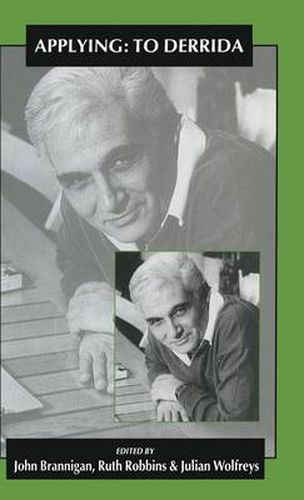Readings Newsletter
Become a Readings Member to make your shopping experience even easier.
Sign in or sign up for free!
You’re not far away from qualifying for FREE standard shipping within Australia
You’ve qualified for FREE standard shipping within Australia
The cart is loading…






This title is printed to order. This book may have been self-published. If so, we cannot guarantee the quality of the content. In the main most books will have gone through the editing process however some may not. We therefore suggest that you be aware of this before ordering this book. If in doubt check either the author or publisher’s details as we are unable to accept any returns unless they are faulty. Please contact us if you have any questions.
Applying: to Derrida: What might such an extraordinary phrase mean? How are we to read its many folds, its strange, enigmatic grammar? Who does the applying? To whom? In what cases does Derrida apply, and why should scholars apply (themselves) to Jacques Derrida, today, more than ever? In order to find possible answers to such questions, all prospective applicants should apply within to this extraordinary collection of essays, which provides some of the most innovative insights and radical departures in the field of Derridean studies. Striking out from a number of new headings and in a number of new directions each of the essays in this collection pushes at the borders of their topics, disciplines and ways of thinking, providing innovative and inventive insights into the work - and application - of Jacques Derrida on a diverse range of themes including Irish identity, communication, ethics, love, tele-technology, Victorian studies, the limits of philosophy, translation, otherness and literature, demonstrating that, today, despite repeated accusations over recent years that the work of Derrida has become passe, there is more vitality and spirit in engaging with the writings of Derrida than ever before. This collection of internationally renowned schol ars and fresh young voices gathered here make a spirited challenge to both the dogmas of conventional ‘deconstruction’ while also making serious demands on those who write off Derridean thought as endless wordplay and pointless punning. This, therefore, will not have been ‘deconstruction’. Those with narrow intellectual perspectives need not apply.
$9.00 standard shipping within Australia
FREE standard shipping within Australia for orders over $100.00
Express & International shipping calculated at checkout
This title is printed to order. This book may have been self-published. If so, we cannot guarantee the quality of the content. In the main most books will have gone through the editing process however some may not. We therefore suggest that you be aware of this before ordering this book. If in doubt check either the author or publisher’s details as we are unable to accept any returns unless they are faulty. Please contact us if you have any questions.
Applying: to Derrida: What might such an extraordinary phrase mean? How are we to read its many folds, its strange, enigmatic grammar? Who does the applying? To whom? In what cases does Derrida apply, and why should scholars apply (themselves) to Jacques Derrida, today, more than ever? In order to find possible answers to such questions, all prospective applicants should apply within to this extraordinary collection of essays, which provides some of the most innovative insights and radical departures in the field of Derridean studies. Striking out from a number of new headings and in a number of new directions each of the essays in this collection pushes at the borders of their topics, disciplines and ways of thinking, providing innovative and inventive insights into the work - and application - of Jacques Derrida on a diverse range of themes including Irish identity, communication, ethics, love, tele-technology, Victorian studies, the limits of philosophy, translation, otherness and literature, demonstrating that, today, despite repeated accusations over recent years that the work of Derrida has become passe, there is more vitality and spirit in engaging with the writings of Derrida than ever before. This collection of internationally renowned schol ars and fresh young voices gathered here make a spirited challenge to both the dogmas of conventional ‘deconstruction’ while also making serious demands on those who write off Derridean thought as endless wordplay and pointless punning. This, therefore, will not have been ‘deconstruction’. Those with narrow intellectual perspectives need not apply.